[SOLVED] Local Variable Referenced Before Assignment

Python treats variables referenced only inside a function as global variables. Any variable assigned to a function’s body is assumed to be a local variable unless explicitly declared as global.

Why Does This Error Occur?
Unboundlocalerror: local variable referenced before assignment occurs when a variable is used before its created. Python does not have the concept of variable declarations. Hence it searches for the variable whenever used. When not found, it throws the error.
Before we hop into the solutions, let’s have a look at what is the global and local variables.
Local Variable Declarations vs. Global Variable Declarations
![local variable 'labels' referenced before assignment [Fixed] typeerror can’t compare datetime.datetime to datetime.date](https://www.pythonpool.com/wp-content/uploads/2024/01/typeerror-cant-compare-datetime.datetime-to-datetime.date_-300x157.webp)
Local Variable Referenced Before Assignment Error with Explanation
Try these examples yourself using our Online Compiler.
Let’s look at the following function:

Explanation
The variable myVar has been assigned a value twice. Once before the declaration of myFunction and within myFunction itself.
Using Global Variables
Passing the variable as global allows the function to recognize the variable outside the function.
Create Functions that Take in Parameters
Instead of initializing myVar as a global or local variable, it can be passed to the function as a parameter. This removes the need to create a variable in memory.
UnboundLocalError: local variable ‘DISTRO_NAME’
This error may occur when trying to launch the Anaconda Navigator in Linux Systems.
Upon launching Anaconda Navigator, the opening screen freezes and doesn’t proceed to load.
Try and update your Anaconda Navigator with the following command.
If solution one doesn’t work, you have to edit a file located at
After finding and opening the Python file, make the following changes:
In the function on line 159, simply add the line:
DISTRO_NAME = None
Save the file and re-launch Anaconda Navigator.
DJANGO – Local Variable Referenced Before Assignment [Form]
The program takes information from a form filled out by a user. Accordingly, an email is sent using the information.
Upon running you get the following error:
We have created a class myForm that creates instances of Django forms. It extracts the user’s name, email, and message to be sent.
A function GetContact is created to use the information from the Django form and produce an email. It takes one request parameter. Prior to sending the email, the function verifies the validity of the form. Upon True , .get() function is passed to fetch the name, email, and message. Finally, the email sent via the send_mail function
Why does the error occur?
We are initializing form under the if request.method == “POST” condition statement. Using the GET request, our variable form doesn’t get defined.
Local variable Referenced before assignment but it is global
This is a common error that happens when we don’t provide a value to a variable and reference it. This can happen with local variables. Global variables can’t be assigned.
This error message is raised when a variable is referenced before it has been assigned a value within the local scope of a function, even though it is a global variable.
Here’s an example to help illustrate the problem:
In this example, x is a global variable that is defined outside of the function my_func(). However, when we try to print the value of x inside the function, we get a UnboundLocalError with the message “local variable ‘x’ referenced before assignment”.
This is because the += operator implicitly creates a local variable within the function’s scope, which shadows the global variable of the same name. Since we’re trying to access the value of x before it’s been assigned a value within the local scope, the interpreter raises an error.
To fix this, you can use the global keyword to explicitly refer to the global variable within the function’s scope:
However, in the above example, the global keyword tells Python that we want to modify the value of the global variable x, rather than creating a new local variable. This allows us to access and modify the global variable within the function’s scope, without causing any errors.
Local variable ‘version’ referenced before assignment ubuntu-drivers
This error occurs with Ubuntu version drivers. To solve this error, you can re-specify the version information and give a split as 2 –
Here, p_name means package name.
With the help of the threading module, you can avoid using global variables in multi-threading. Make sure you lock and release your threads correctly to avoid the race condition.
When a variable that is created locally is called before assigning, it results in Unbound Local Error in Python. The interpreter can’t track the variable.
Therefore, we have examined the local variable referenced before the assignment Exception in Python. The differences between a local and global variable declaration have been explained, and multiple solutions regarding the issue have been provided.
Trending Python Articles
![local variable 'labels' referenced before assignment [Fixed] nameerror: name Unicode is not defined](https://www.pythonpool.com/wp-content/uploads/2024/01/Fixed-nameerror-name-Unicode-is-not-defined-300x157.webp)
- Python Basics
- Interview Questions
- Python Quiz
- Popular Packages
- Python Projects
- Practice Python
- AI With Python
- Learn Python3
- Python Automation
- Python Web Dev
- DSA with Python
- Python OOPs
- Dictionaries
UnboundLocalError Local variable Referenced Before Assignment in Python
Handling errors is an integral part of writing robust and reliable Python code. One common stumbling block that developers often encounter is the "UnboundLocalError" raised within a try-except block. This error can be perplexing for those unfamiliar with its nuances but fear not – in this article, we will delve into the intricacies of the UnboundLocalError and provide a comprehensive guide on how to effectively use try-except statements to resolve it.
What is UnboundLocalError Local variable Referenced Before Assignment in Python?
The UnboundLocalError occurs when a local variable is referenced before it has been assigned a value within a function or method. This error typically surfaces when utilizing try-except blocks to handle exceptions, creating a puzzle for developers trying to comprehend its origins and find a solution.
Why does UnboundLocalError: Local variable Referenced Before Assignment Occur?
below, are the reasons of occurring "Unboundlocalerror: Try Except Statements" in Python :
Variable Assignment Inside Try Block
Reassigning a global variable inside except block.
- Accessing a Variable Defined Inside an If Block
In the below code, example_function attempts to execute some_operation within a try-except block. If an exception occurs, it prints an error message. However, if no exception occurs, it prints the value of the variable result outside the try block, leading to an UnboundLocalError since result might not be defined if an exception was caught.
In below code , modify_global function attempts to increment the global variable global_var within a try block, but it raises an UnboundLocalError. This error occurs because the function treats global_var as a local variable due to the assignment operation within the try block.
Solution for UnboundLocalError Local variable Referenced Before Assignment
Below, are the approaches to solve "Unboundlocalerror: Try Except Statements".
Initialize Variables Outside the Try Block
Avoid reassignment of global variables.
In modification to the example_function is correct. Initializing the variable result before the try block ensures that it exists even if an exception occurs within the try block. This helps prevent UnboundLocalError when trying to access result in the print statement outside the try block.
Below, code calculates a new value ( local_var ) based on the global variable and then prints both the local and global variables separately. It demonstrates that the global variable is accessed directly without being reassigned within the function.
In conclusion , To fix "UnboundLocalError" related to try-except statements, ensure that variables used within the try block are initialized before the try block starts. This can be achieved by declaring the variables with default values or assigning them None outside the try block. Additionally, when modifying global variables within a try block, use the `global` keyword to explicitly declare them.
Similar Reads
- UnboundLocalError Local variable Referenced Before Assignment in Python Handling errors is an integral part of writing robust and reliable Python code. One common stumbling block that developers often encounter is the "UnboundLocalError" raised within a try-except block. This error can be perplexing for those unfamiliar with its nuances but fear not – in this article, w 4 min read
- How to Fix - UnboundLocalError: Local variable Referenced Before Assignment in Python Developers often encounter the UnboundLocalError Local Variable Referenced Before Assignment error in Python. In this article, we will see what is local variable referenced before assignment error in Python and how to fix it by using different approaches. What is UnboundLocalError: Local variable Re 3 min read
- Python | Accessing variable value from code scope Sometimes, we just need to access a variable other than the usual way of accessing by it's name. There are many method by which a variable can be accessed from the code scope. These are by default dictionaries that are created and which keep the variable values as dictionary key-value pair. Let's ta 3 min read
- Variables under the hood in Python In simple terms, variables are names attached to particular objects in Python. To create a variable, you just need to assign a value and then start using it. The assignment is done with a single equals sign (=): C/C++ Code # Variable named age age = 20 print(age) # Variable named id_number id_no = 4 3 min read
- Different Forms of Assignment Statements in Python We use Python assignment statements to assign objects to names. The target of an assignment statement is written on the left side of the equal sign (=), and the object on the right can be an arbitrary expression that computes an object. There are some important properties of assignment in Python :- 3 min read
- Insert a Variable into a String - Python In Python, inserting a variable inside a string is a common task. There are different ways to do this depending on which method you find easiest. Let’s look at some simple methods to insert variables into strings. Using + OperatorThe simplest way to insert a variable into a string is by using the + 1 min read
- Python program to find number of local variables in a function Given a Python program, task is to find the number of local variables present in a function. Examples: Input : a = 1 b = 2.1 str = 'GeeksForGeeks' Output : 3 We can use the co_nlocals() function which returns the number of local variables used by the function to get the desired result. Code #1: # Im 1 min read
- Python Program to Find and Print Address of Variable In this article, we are going to see how to find and print the address of the Python variable. It can be done in these ways: Using id() functionUsing addressof() functionUsing hex() functionMethod 1: Find and Print Address of Variable using id()We can get an address using id() function, id() functio 2 min read
- Accessing Python Function Variable Outside the Function In Python, variables defined within a function have local scope by default. But to Access function variables outside the function usually requires the use of the global keyword, but can we do it without using Global. In this article, we will see how to access a function variable outside the function 4 min read
- How to Access Dictionary Values in Python Using For Loop A dictionary is a built-in data type in Python designed to store key-value pairs of data. The most common method to access values in Python is through the use of a for loop. This article explores various approaches to accessing values in a dictionary using a for loop. Access Dictionary Values in Pyt 2 min read
- Python | Using variable outside and inside the class and method In Python, we can define the variable outside the class, inside the class, and even inside the methods. Let's see, how to use and access these variables throughout the program. Variable defined outside the class: The variables that are defined outside the class can be accessed by any class or any me 3 min read
- Python TabError: Inconsistent Use of Tabs and Spaces in Indentation Python, known for its readability and simplicity, enforces strict indentation rules to structure code. However, encountering a TabError can be frustrating, especially when the code appears to be properly aligned. In this article, we'll explore what a TabError is, and how to resolve TabError in Pytho 2 min read
- Importerror: "Unknown Location" in Python Encountering the ImportError: "Unknown location" in Python is a situation where the interpreter is unable to locate the module or package you are trying to import. This article addresses the causes behind this error, provides examples of its occurrence, and offers effective solutions to resolve it. 3 min read
- Importerror: Unknown Location in Python One common issue that developers may encounter is the "ImportError: Unknown Location." This error occurs when Python is unable to locate the module or package that you are trying to import. In this article, we will explore the reasons behind the "ImportError: Unknown Location" and provide approaches 3 min read
- SyntaxError: ‘return’ outside function in Python We are given a problem of how to solve the 'Return Outside Function' Error in Python. In this article, we will see how to solve the 'Return Outside Function' Error in Python with reasons for it's occurring and also approaches to solve SyntaxError: ‘return’ outside function” in Python. What is Syntax 4 min read
- Python program to create dynamically named variables from user input Given a string input, our task is to write a Python program to create a variable from that input (as a variable name) and assign it to some value. Below are the methods to create dynamically named variables from user input. Using globals() method to create dynamically named variables Here we are usi 2 min read
- Shared Reference in Python Let, we assign a variable x to value 5, and another variable y to the variable x. x = 5 y = x When Python looks at the first statement, what it does is that, first, it creates an object to represent the value 5. Then, it creates the variable x if it doesn't exist and made it a reference to this new 4 min read
- How to Change Class Attributes By Reference in Python We have the problem of how to change class attributes by reference in Python, we will see in this article how can we change the class attributes by reference in Python. What is Class Attributes?Class attributes are typically defined outside of any method within a class and are shared among all insta 3 min read
- Changing Variable Names With Python For Loops When we write variable names play a crucial role in code readability and maintainability. However, there are situations where you might need to change variable names systematically, perhaps to adhere to a naming convention, improve clarity, or for any other reason. In Python, the flexibility of for 3 min read
- Python Programs
- Python Errors
Improve your Coding Skills with Practice
What kind of Experience do you want to share?
How to fix UnboundLocalError: local variable 'x' referenced before assignment in Python
by Nathan Sebhastian
Posted on May 26, 2023
Reading time: 2 minutes

One error you might encounter when running Python code is:
This error commonly occurs when you reference a variable inside a function without first assigning it a value.
You could also see this error when you forget to pass the variable as an argument to your function.
Let me show you an example that causes this error and how I fix it in practice.
How to reproduce this error
Suppose you have a variable called name declared in your Python code as follows:
Next, you created a function that uses the name variable as shown below:
When you execute the code above, you’ll get this error:
This error occurs because you both assign and reference a variable called name inside the function.
Python thinks you’re trying to assign the local variable name to name , which is not the case here because the original name variable we declared is a global variable.
How to fix this error
To resolve this error, you can change the variable’s name inside the function to something else. For example, name_with_title should work:
As an alternative, you can specify a name parameter in the greet() function to indicate that you require a variable to be passed to the function.
When calling the function, you need to pass a variable as follows:
This code allows Python to know that you intend to use the name variable which is passed as an argument to the function as part of the newly declared name variable.
Still, I would say that you need to use a different name when declaring a variable inside the function. Using the same name might confuse you in the future.
Here’s the best solution to the error:
Now it’s clear that we’re using the name variable given to the function as part of the value assigned to name_with_title . Way to go!
The UnboundLocalError: local variable 'x' referenced before assignment occurs when you reference a variable inside a function before declaring that variable.
To resolve this error, you need to use a different variable name when referencing the existing variable, or you can also specify a parameter for the function.
I hope this tutorial is useful. See you in other tutorials.
Take your skills to the next level ⚡️
I'm sending out an occasional email with the latest tutorials on programming, web development, and statistics. Drop your email in the box below and I'll send new stuff straight into your inbox!
Hello! This website is dedicated to help you learn tech and data science skills with its step-by-step, beginner-friendly tutorials. Learn statistics, JavaScript and other programming languages using clear examples written for people.
Learn more about this website
Connect with me on Twitter
Or LinkedIn
Type the keyword below and hit enter
Click to see all tutorials tagged with:
Adventures in Machine Learning
4 ways to fix local variable referenced before assignment error in python, resolving the local variable referenced before assignment error in python.
Python is one of the world’s most popular programming languages due to its simplicity, readability, and versatility. Despite its many advantages, when coding in Python, one may encounter various errors, with the most common being the “local variable referenced before assignment” error.
Even the most experienced Python developers have encountered this error at some point in their programming career. In this article, we will look at four effective strategies for resolving the local variable referenced before assignment error in Python.
Strategy 1: Assigning a Value before Referencing
The first strategy is to assign a value to a variable before referencing it. The error occurs when the variable is referenced before it is assigned a value.
This problem can be avoided by initializing the variable before referencing it. For example, let us consider the snippet below:
In the snippet above, the variables x and y are not assigned values before they are referenced in the print statement. Therefore, we will get a local variable “referenced before assignment” error.
To resolve this error, we must initialize the variables before referencing them. We can avoid this error by assigning a value to x and y before they are referenced, as shown below:

Strategy 2: Using the Global Keyword
In Python, variables declared inside a function are considered local variables. Thus, they are separate from other variables declared outside of the function.
If we want to use a variable outside of the function, we must use the global keyword. Using the global keyword tells Python that you want to use the variable that was defined globally, not locally.
For example:
In the code snippet above, the global keyword tells Python to use the variable x defined outside of the function rather than a local variable named x . Thus, Python will output 30.
Strategy 3: Adding Input Parameters for Functions
Another way to avoid the local variable referenced before assignment error is by adding input parameters to functions.
In the code snippet above, x and y are variables that are passed into the add_numbers function as arguments.
This approach allows us to avoid the local variable referenced before assignment error because the variables are being passed into the function as input parameters.
Strategy 4: Initializing Variables before Loops or Conditionals
Finally, it’s also a good practice to initialize the variables before loops or conditionals.
If you are defining a variable within a loop, you must initialize it before the loop starts. This way, the variable already exists, and we can update the value inside the loop.
In the code snippet above, the variable sum has been initialized with the value of 0 before the loop runs. Thus, we can update and use the variable inside the loop.
In conclusion, the “local variable referenced before assignment” error is a common issue in Python. However, with the strategies discussed in this article, you can avoid the error and write clean Python code.
Remember to initialize your variables, use the global keyword, add input parameters in functions, and initialize variables before loops or conditionals. By following these techniques, your Python code will be error-free and much easier to manage.
In essence, this article has provided four key strategies for resolving the “local variable referenced before assignment” error that is common in Python. These strategies include initializing variables before referencing, using the global keyword, adding input parameters to functions, and initializing variables before loops or conditionals.
These techniques help to ensure clean code that is free from errors. By implementing these strategies, developers can improve their code quality and avoid time-wasting errors that can occur in their work.
Popular Posts
Maximizing sql: practical tips and tricks for finding max values and creating tables, mastering numpy: filtering techniques and examples, navigating python namespace hierarchy: understanding variable storage.
- Terms & Conditions
- Privacy Policy
Local variable referenced before assignment in Python
Last updated: Apr 8, 2024 Reading time · 4 min

# Local variable referenced before assignment in Python
The Python "UnboundLocalError: Local variable referenced before assignment" occurs when we reference a local variable before assigning a value to it in a function.
To solve the error, mark the variable as global in the function definition, e.g. global my_var .

Here is an example of how the error occurs.
We assign a value to the name variable in the function.
# Mark the variable as global to solve the error
To solve the error, mark the variable as global in your function definition.
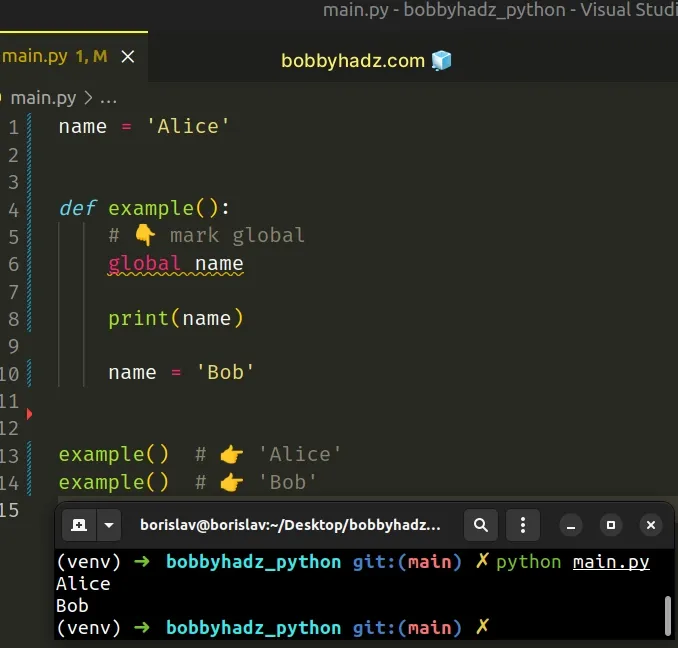
If a variable is assigned a value in a function's body, it is a local variable unless explicitly declared as global .
# Local variables shadow global ones with the same name
You could reference the global name variable from inside the function but if you assign a value to the variable in the function's body, the local variable shadows the global one.
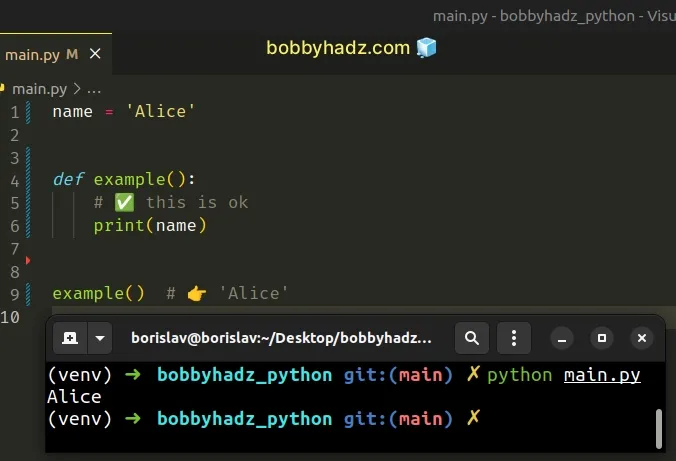
Accessing the name variable in the function is perfectly fine.
On the other hand, variables declared in a function cannot be accessed from the global scope.
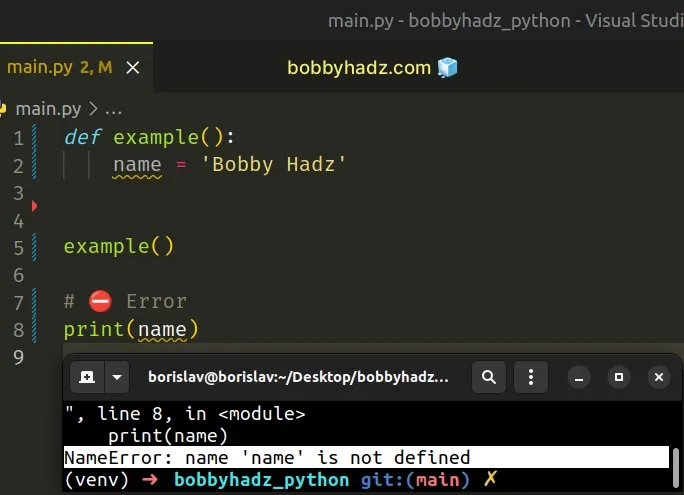
The name variable is declared in the function, so trying to access it from outside causes an error.
Make sure you don't try to access the variable before using the global keyword, otherwise, you'd get the SyntaxError: name 'X' is used prior to global declaration error.
# Returning a value from the function instead
An alternative solution to using the global keyword is to return a value from the function and use the value to reassign the global variable.
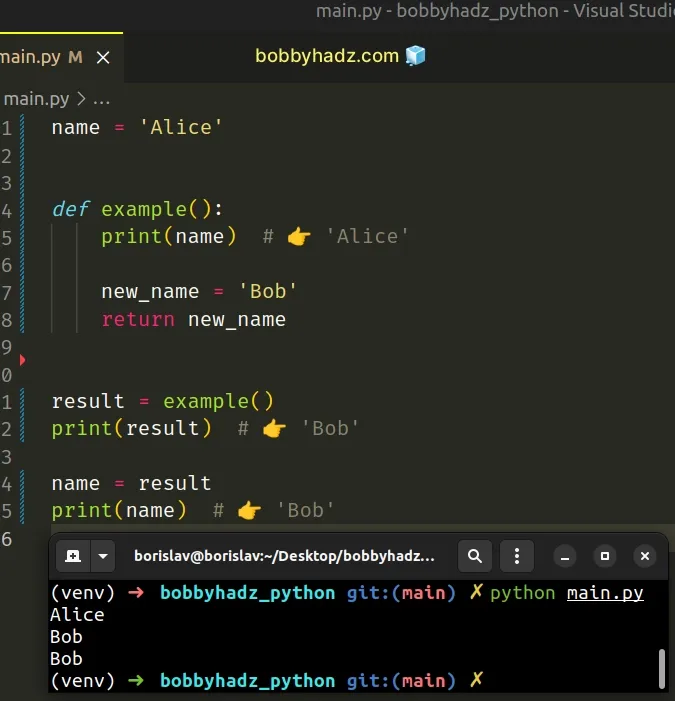
We simply return the value that we eventually use to assign to the name global variable.
# Passing the global variable as an argument to the function
You should also consider passing the global variable as an argument to the function.
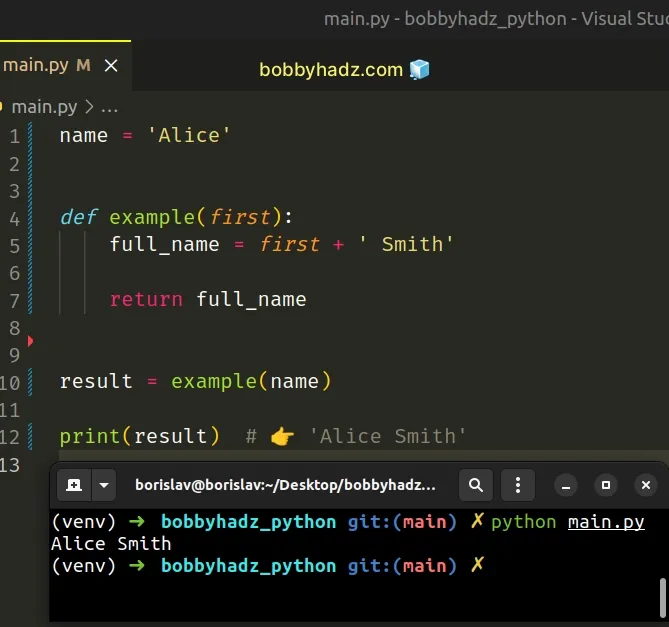
We passed the name global variable as an argument to the function.
If we assign a value to a variable in a function, the variable is assumed to be local unless explicitly declared as global .
# Assigning a value to a local variable from an outer scope
If you have a nested function and are trying to assign a value to the local variables from the outer function, use the nonlocal keyword.
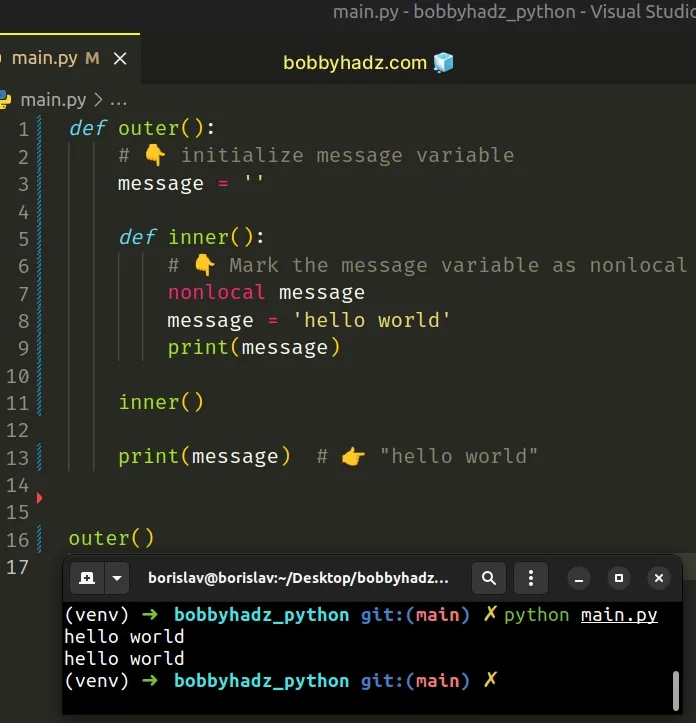
The nonlocal keyword allows us to work with the local variables of enclosing functions.
Had we not used the nonlocal statement, the call to the print() function would have returned an empty string.
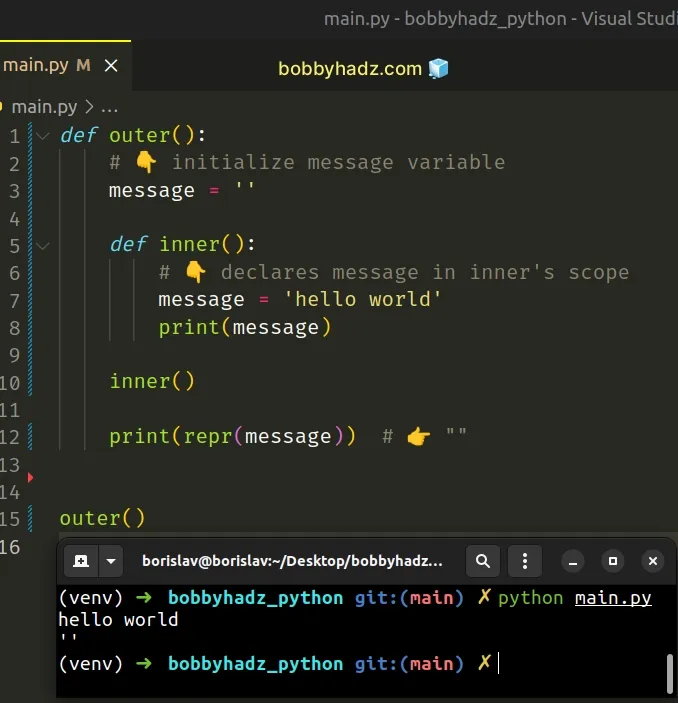
Printing the message variable on the last line of the function shows an empty string because the inner() function has its own scope.
Changing the value of the variable in the inner scope is not possible unless we use the nonlocal keyword.
Instead, the message variable in the inner function simply shadows the variable with the same name from the outer scope.
# Discussion
As shown in this section of the documentation, when you assign a value to a variable inside a function, the variable:
- Becomes local to the scope.
- Shadows any variables from the outer scope that have the same name.
The last line in the example function assigns a value to the name variable, marking it as a local variable and shadowing the name variable from the outer scope.
At the time the print(name) line runs, the name variable is not yet initialized, which causes the error.
The most intuitive way to solve the error is to use the global keyword.
The global keyword is used to indicate to Python that we are actually modifying the value of the name variable from the outer scope.
- If a variable is only referenced inside a function, it is implicitly global.
- If a variable is assigned a value inside a function's body, it is assumed to be local, unless explicitly marked as global .
If you want to read more about why this error occurs, check out [this section] ( this section ) of the docs.
# Additional Resources
You can learn more about the related topics by checking out the following tutorials:
- SyntaxError: name 'X' is used prior to global declaration

Borislav Hadzhiev
Web Developer

Copyright © 2024 Borislav Hadzhiev

Top 2 Methods to Solve the ‘Local Variable Referenced Before Assignment’ Error in Python
Table of contents.
When working with Python, encountering the UnboundLocalError can be quite common, especially when dealing with variables that you intend to access globally within a function. This error typically occurs when a variable is referenced before it has been assigned a value within the local scope.
The Problem: Local Variable Referenced Before Assignment
Consider the following example:
Running the code above yields the error:
The critical point here is whether the variable test1 is recognized as global or local. In this case, Python reinterprets test1 as a local variable due to the attempted modification with += , which leads to confusion when it’s referenced before being assigned any value in the local scope.
So how can you resolve this issue effectively without passing test1 as an argument into test_func ? Let’s explore two main methods to approach this.
Method 1: Avoiding Globals
The best practice suggests minimizing the use of global variables. Instead of modifying a global variable directly, consider passing the variable to a function. Here’s how you could rewrite the example to avoid using a global variable entirely:
In this example, test_func takes a parameter x , performs the operation, and returns the modified value, allowing us to keep the variable scope clean.
Method 2: Declaring a Variable as Global
If modifying a global variable within a function is necessary, use the global keyword. Here’s how you can clarify that test1 should be treated as a global variable within test_func :
By using global test1 , you inform Python of your intention to operate on the global instance of test1 , thus eliminating the UnboundLocalError .
Further Alternatives
While the two methods outlined above are the most straightforward solutions, you can also consider using classes to encapsulate your variables and methods, managing state more formally through object-oriented programming. Here’s a simple example:
This alternative approach provides a structured way to manage your variables, improving code readability and maintainability.
FAQs on Top 2 Methods to Solve the ‘Local Variable Referenced Before Assignment’ Error in Python
Q: what is unboundlocalerror in python, q: how can i avoid using global variables in python, q: does using the global keyword affect performance, q: what are the best practices for variable scope in python.
For additional resources on Python programming, you might find W3Schools Python Tutorials and Geeks for Geeks Python Programming useful.

Need an Expert?
I have over 10 years of experience in coding. My journey began in 2014, starting with HTML, CSS, SQL, C#, and ASP.NET. In 2016, I expanded my skills with more...
ASP.NET WebForms and developed my first major project, a Recipe Maker Website. Over the years, I have embraced new technologies like Blazor, .NET Core, and Tailwind CSS, and I focus on creating modern, scalable web applications. I enjoy solving challenges, building clean, maintainable code, and collaborating on exciting projects. Currently, I focus on full stack interactive apps using Real-Time, AI powered using Blazor, Tailwind CSS and More. I'm always eager to learn and grow with new technologies.
How to Solve Error - Local Variable Referenced Before Assignment in Python
- Python How-To's
- How to Solve Error - Local Variable …
Check the Variable Scope to Fix the local variable referenced before assignment Error in Python
Initialize the variable before use to fix the local variable referenced before assignment error in python, use conditional assignment to fix the local variable referenced before assignment error in python.
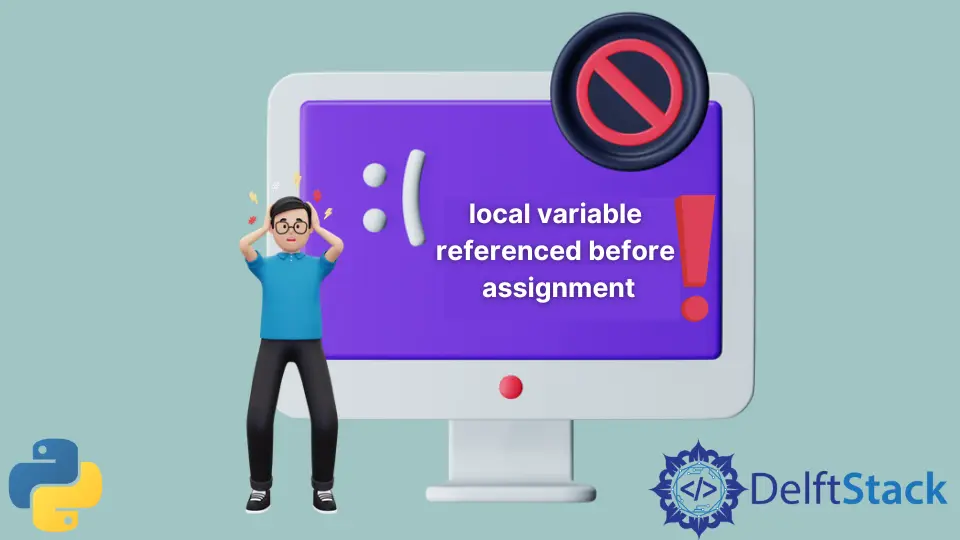
This article delves into various strategies to resolve the common local variable referenced before assignment error. By exploring methods such as checking variable scope, initializing variables before use, conditional assignments, and more, we aim to equip both novice and seasoned programmers with practical solutions.
Each method is dissected with examples, demonstrating how subtle changes in code can prevent this frequent error, enhancing the robustness and readability of your Python projects.
The local variable referenced before assignment occurs when some variable is referenced before assignment within a function’s body. The error usually occurs when the code is trying to access the global variable.
The primary purpose of managing variable scope is to ensure that variables are accessible where they are needed while maintaining code modularity and preventing unexpected modifications to global variables.
We can declare the variable as global using the global keyword in Python. Once the variable is declared global, the program can access the variable within a function, and no error will occur.
The below example code demonstrates the code scenario where the program will end up with the local variable referenced before assignment error.
In this example, my_var is a global variable. Inside update_var , we attempt to modify it without declaring its scope, leading to the Local Variable Referenced Before Assignment error.
We need to declare the my_var variable as global using the global keyword to resolve this error. The below example code demonstrates how the error can be resolved using the global keyword in the above code scenario.
In the corrected code, we use the global keyword to inform Python that my_var references the global variable.
When we first print my_var , it displays the original value from the global scope.
After assigning a new value to my_var , it updates the global variable, not a local one. This way, we effectively tell Python the scope of our variable, thus avoiding any conflicts between local and global variables with the same name.
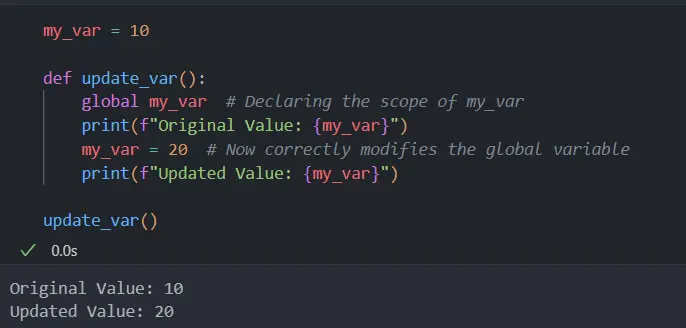
Ensure that the variable is initialized with some value before using it. This can be done by assigning a default value to the variable at the beginning of the function or code block.
The main purpose of initializing variables before use is to ensure that they have a defined state before any operations are performed on them. This practice is not only crucial for avoiding the aforementioned error but also promotes writing clear and predictable code, which is essential in both simple scripts and complex applications.
In this example, the variable total is used in the function calculate_total without prior initialization, leading to the Local Variable Referenced Before Assignment error. The below example code demonstrates how the error can be resolved in the above code scenario.
In our corrected code, we initialize the variable total with 0 before using it in the loop. This ensures that when we start adding item values to total , it already has a defined state (in this case, 0).
This initialization is crucial because it provides a starting point for accumulation within the loop. Without this step, Python does not know the initial state of total , leading to the error.
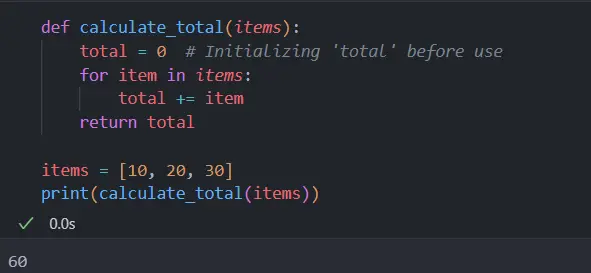
Conditional assignment allows variables to be assigned values based on certain conditions or logical expressions. This method is particularly useful when a variable’s value depends on certain prerequisites or states, ensuring that a variable is always initialized before it’s used, thereby avoiding the common error.
In this example, message is only assigned within the if and elif blocks. If neither condition is met (as with guest ), the variable message remains uninitialized, leading to the Local Variable Referenced Before Assignment error when trying to print it.
The below example code demonstrates how the error can be resolved in the above code scenario.
In the revised code, we’ve included an else statement as part of our conditional logic. This guarantees that no matter what value user_type holds, the variable message will be assigned some value before it is used in the print function.
This conditional assignment ensures that the message is always initialized, thereby eliminating the possibility of encountering the Local Variable Referenced Before Assignment error.
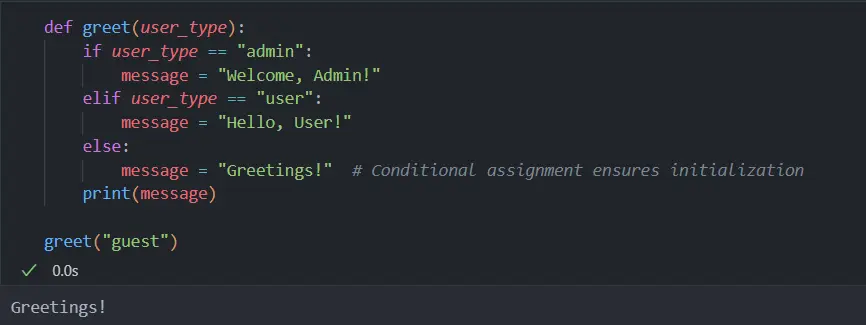
Throughout this article, we have explored multiple approaches to address the Local Variable Referenced Before Assignment error in Python. From the nuances of variable scope to the effectiveness of initializations and conditional assignments, these strategies are instrumental in developing error-free code.
The key takeaway is the importance of understanding variable scope and initialization in Python. By applying these methods appropriately, programmers can not only resolve this specific error but also enhance the overall quality and maintainability of their code, making their programming journey smoother and more rewarding.
How to Fix Local Variable Referenced Before Assignment Error in Python

Table of Contents
Fixing local variable referenced before assignment error.
In Python , when you try to reference a variable that hasn't yet been given a value (assigned), it will throw an error.
That error will look like this:
In this post, we'll see examples of what causes this and how to fix it.
Let's begin by looking at an example of this error:
If you run this code, you'll get
The issue is that in this line:
We are defining a local variable called value and then trying to use it before it has been assigned a value, instead of using the variable that we defined in the first line.
If we want to refer the variable that was defined in the first line, we can make use of the global keyword.
The global keyword is used to refer to a variable that is defined outside of a function.
Let's look at how using global can fix our issue here:
Global variables have global scope, so you can referenced them anywhere in your code, thus avoiding the error.
If you run this code, you'll get this output:
In this post, we learned at how to avoid the local variable referenced before assignment error in Python.
The error stems from trying to refer to a variable without an assigned value, so either make use of a global variable using the global keyword, or assign the variable a value before using it.
Thanks for reading!

- Privacy Policy
- Terms of Service

IMAGES
VIDEO
COMMENTS
The labels variable in your function is only instantiated if the if statement returns True, otherwise the variable never gets created.. You need to set up an else statement to create the variable if the initial check doesn't return True (or give labels a default value before the if statement, as suggested by Ahmad):. @app.route('/', methods=['GET', 'POST']) def upload_file(): # Option 1: give ...
Output. Hangup (SIGHUP) Traceback (most recent call last): File "Solution.py", line 7, in <module> example_function() File "Solution.py", line 4, in example_function x += 1 # Trying to modify global variable 'x' without declaring it as global UnboundLocalError: local variable 'x' referenced before assignment Solution for Local variable Referenced Before Assignment in Python
DJANGO - Local Variable Referenced Before Assignment [Form] The program takes information from a form filled out by a user. Accordingly, an email is sent using the information. ... Therefore, we have examined the local variable referenced before the assignment Exception in Python. The differences between a local and global variable ...
Avoid Reassignment of Global Variables. Below, code calculates a new value (local_var) based on the global variable and then prints both the local and global variables separately.It demonstrates that the global variable is accessed directly without being reassigned within the function.
The UnboundLocalError: local variable 'x' referenced before assignment occurs when you reference a variable inside a function before declaring that variable. To resolve this error, you need to use a different variable name when referencing the existing variable, or you can also specify a parameter for the function. I hope this tutorial is useful.
Strategy 2: Using the Global Keyword. In Python, variables declared inside a function are considered local variables. Thus, they are separate from other variables declared outside of the function.
If a variable is assigned a value in a function's body, it is a local variable unless explicitly declared as global. # Local variables shadow global ones with the same name. You could reference the global name variable from inside the function but if you assign a value to the variable in the function's body, the local variable shadows the ...
UnboundLocalError: local variable 'test1' referenced before assignment. The critical point here is whether the variable test1 is recognized as global or local. In this case, Python reinterprets test1 as a local variable due to the attempted modification with += , which leads to confusion when it's referenced before being assigned any value in ...
This tutorial explains the reason and solution of the python error local variable referenced before assignment
value = value + 1 We are defining a local variable called value and then trying to use it before it has been assigned a value, instead of using the variable that we defined in the first line.. If we want to refer the variable that was defined in the first line, we can make use of the global keyword.. The global keyword is used to refer to a variable that is defined outside of a function.